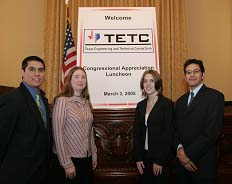Students, engineering deans and company executives throughout Texas converged on Capitol Hill March 3 to convey their appreciation to the Congressional delegation for past federal support of the Texas Engineering and Technical Consortium (TETC). Congressman and House Majority Leader Tom DeLay has been a long time supporter of TETC and a national leader in improving the number of engineering graduates from Texas schools.
TETC is a partnership among government, industry and academia that directs grants and other resources to eligible institutions of higher education to increase the number of electrical engineering and computer science graduates, create technical research and degree programs, and encourage collaborative efforts between academic programs and the private sector. TETC is hosted at the SMU School of Engineering and is making significant strides to increase the number of B.S. graduates in electrical engineering and computer science.
“Educating and training a diverse engineering student body is important both for Houston and the State of Texas. TETC is extremely important in allowing our faculty to develop and implement new methodology to increase student enrollment, diversity and retention within engineering,“ said Raymond Flumerfelt, dean of the Cullen College of Engineering at the University of Houston.
"The Texas delegation has truly responded to the skilled workforce challenges in Texas by securing $4 million over two years from federal appropriations to help TETC recruit, retain and place electrical engineering and computer science students," said Tegwin Pulley, chair of TETC and a Texas Instruments vice president.
Since the creation of TETC three years ago, companies have contributed another $5 million in funding, equipment and other in-kind support. "Industry understands the impact of the coming shortfall of engineers. This is a problem that is being solved not by just a few universities or companies but through the enthusiastic alliance of the state & federal government, private industry and 34 universities in Texas," said Mark McClure, TETC's executive director.
The demand for electrical engineering and computer science workers in Texas and the nation is staggering, and innovative programs like TETC are making a difference. "Lockheed Martin needs 90,000 new engineers in the next decade," said Whitney Strauss of the defense contractor with many Texas facilities. Ray Almgren of National Instruments in Austin said TETC allows his company to recruit from and work with all 33 Texas schools offering EE and CS degrees.
In attendance at the luncheon were many of the legislative staffers of the Texas Delegation. Attendees included Matt Wolf for Rep. Tom DeLay, Tony Harrison from Rep. Al Green office, Josue Morales and Yadira Castellanos for Rep. Gonzalez, , Aarti Shah for Rep Joe Barton, Gene Irisari, Charles Fields and Katie Moraver for Rep. Michael McCaul, Diana Ramirez and Adam Writing attended for Rep. Lloyd Doggett, and Jamie McWright came with Meredith Mino from Senator Cornyn office.
During the luncheon the Texas delegation heard directly from four students who had been helped by TETC funded improvements to their schools engineering education system. Four students came from the University of Texas at Austin, UT Dallas, UT Pan American and UTEP. All of the students told their personal stories of getting into and staying in either EE or computer science disciplines. “Entering engineering students need some extra support," said Joel Quintana, an EE senior. "While this is what I want to do with my career it’s not the easiest goal to accomplish."
After lunch TETC representatives attended separate meetings with some members of Congress. Rep. Pete Sessions agreed to support the support for TETC’s FY06 request for $2 million.
Texas is addressing a statewide and national skilled workforce dilemma. In 2001, the Texas Legislature passed and the Governor signed into law SB 353, which created the TETC program. SB 353 can provide up to $5 million per year in state matching funds for contributions made by public and private companies, individuals, foundations, organizations and the federal government. The consortium is an innovative collaboration between government, industry and higher education. TETC companies -- including Advanced Micro Devices (AMD), Applied Materials, Freescale, Hewlett-Packard, Intel, International SEMATECH, Lockheed Martin, National Instruments, National Semiconductor, Sabre, SBC Foundation, and Texas Instruments -- have committed more than $5 million to date.
Benefits of the TETC grant funds are wide-ranging. TETC has conducted two grant rounds, awarding over $10 million to Texas colleges and universities. The Texas Higher Education Coordinating Board established peer review panels with out-of-state expert review teams to evaluate 97 proposals requesting over $27 million in funding - which far exceeded TETC's resources. Through the merit-based evaluation process, 26 universities have received funding, 15 computer science and 16 electrical engineering departments. A third round of grants is scheduled for 2005.
TETC's strategic objectives for 2005 include $2 million in additional federal funding in Fiscal Year 2006 which will be eligible for matching dollars from the State of Texas and identification of a sustainable source of federal funding for the future. "To fully leverage the resources that the state and private sector have committed to TETC, we respectfully requested a third and final $2 million appropriation in Fiscal Year 2006," said Pulley. "We are also continuing to engage the federal government through competitive grant programs in order to achieve TETC's objectives."
